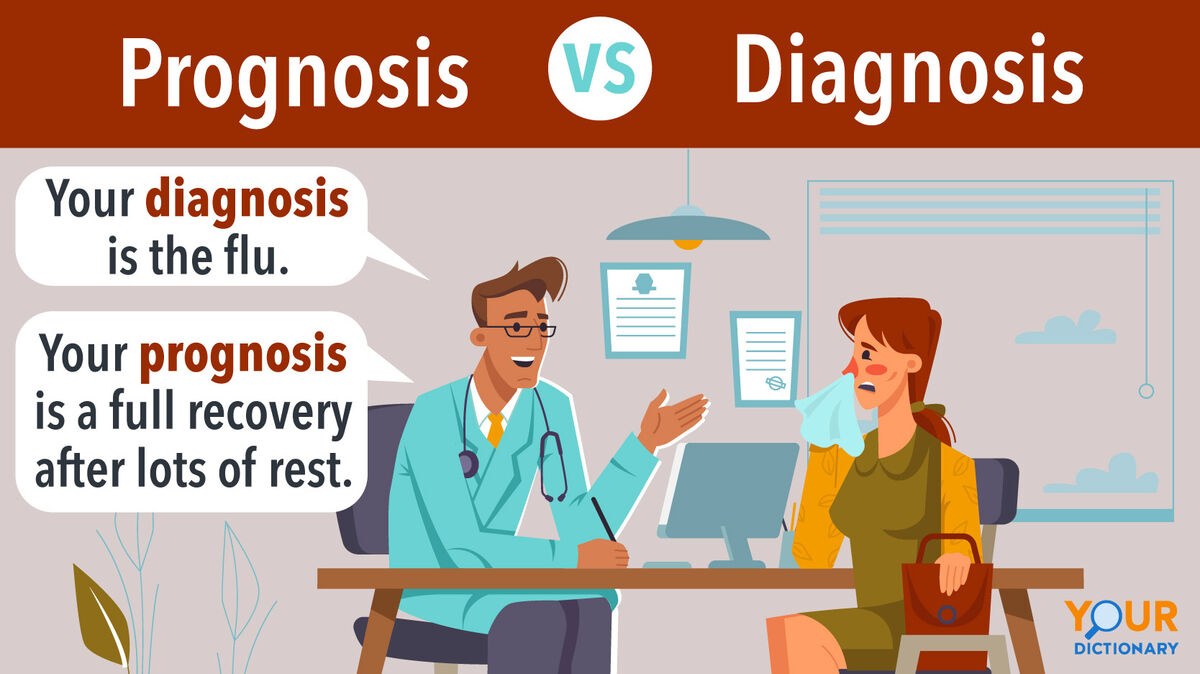
When your doctor gives you a prognosis, it's different than when they give you a diagnosis. One isn't necessarily better or worse than the other, but you need both. Knowing the difference between a prognosis and a diagnosis can help you better understand your medical condition — and it may even help in your recovery.
Diagnosis Comes Before Prognosis
Patients want to know if they're going to be okay when they go to the doctor. But that's not the doctor's first step. They have to know what disease the patient has before they determine if the patient will be okay.
- diagnosis - determining which disease you have
- prognosis - determining how the disease will progress
As you can see, you need a diagnosis (what it is) before you can receive a prognosis (what it will do). The diagnosis plays a large part in determining your prognosis.
A Prefix Makes All the Difference
Prognosis and diagnosis sound similar because they share the Greek root gnosis, meaning "knowledge." However, their prefixes make their meanings and functions in the medical world quite different.
Prefix | Root | Meaning |
| dia- (between) | gnosis | discerning between choices |
| pro- (before) | gnosis | knowing something before it happens |
When a doctor gives you a diagnosis, they're deciding which disease you have between several possibilities. When they give you a prognosis, they're determining what the disease will do before it progresses. The key to both words is gnosis — doctors are using their knowledge to treat you properly.
Diagnosis Meaning: What Disease It Is
The noun diagnosis has a Greek origin (originally diagignōskein — "to distinguish"). While its meaning in Greek is more general, the word's Latin application relates only to the medical world when determining what disease a person has. Examples of diagnosis in a sentence include:
- Ryan received his ADHD diagnosis when he was 12 years old.
- My brother has a diagnosis of brain cancer, but they don't know what stage it's in.
- After hearing the baby's cough, the pediatrician made a diagnosis of pneumonia.
- Dr. Taylor changed her original diagnosis of a broken ankle once she saw the patient's x-ray.
- Rebecca's diabetes diagnosis has caused her to change her diet and lifestyle.
Verb Form: Diagnose
You may also hear the verb form of diagnosis, which is diagnose. For example:
- It's impossible to diagnose a patient with a disease without examining them.
- Experienced nurses can often diagnose their patients before the doctor sees them.
- Kendra was diagnosed with anxiety when she was 16 years old.
Prognosis Meaning: What the Disease Will Do
Prognosis comes from the Greek word for "knowing beforehand" (progignōskein). It's most often used in a medical context to describe a doctor's estimation of how a disease will progress, and how favorably or unfavorably it will affect a patient's life and survival.
Examples of prognosis in a sentence include:
- If you take this medication every day, your prognosis will be good.
- A diagnosis of pancreatic cancer often results in a poor prognosis for patients.
- The patient's prognosis wasn't favorable once the doctor reviewed the test results.
- Because Shelly's cancer was detected early, her prognosis is positive and she has a good chance of survival.
- The prognosis for breaking a bone in childhood is generally good, although children sometimes need physical therapy during their recovery.
Verb Form: Prognose
Though much less common than diagnose, doctors sometimes use the verb prognose to describe the act of giving someone a prognosis. For example:
- Dr. Sayani couldn't prognose his patient until he'd done more research on her condition.
- The medical team prognosed a full recovery for the baby.
- If this medication works, I can prognose a positive outcome for my patient.
Prognosis and Diagnosis Outside the Medical World
Although prognosis and diagnosis are generally used in the context of medicine, they can also be found in different contexts. Diagnosis, for example, can refer to anyone determining the cause of a problem. For example:
- The school board issued a statement regarding their diagnosis of the district's failing discipline policy.
- After eating at the new restaurant, my diagnosis is that the slow service is driving business away.
You can use prognosis when describing a foreseen outcome to any situation. For example:
- The prognosis for our marriage improved after we attended counseling.
- Unless I get a new phone, the prognosis for my social life is really bad.
Greek and Latin Influence Modern Language
It's not often that grammar impacts your health. However, in the case of prognosis vs. diagnosis, knowing which word identifies a disease and which word determines how the disease will affect one's life is key for navigating the recovery journey. These words are on a long list of medical terminology influenced (and adapted from) Greek and Latin vocabulary. Learn how Latin also influences the law with a quick guide to Latin words in the legal profession.